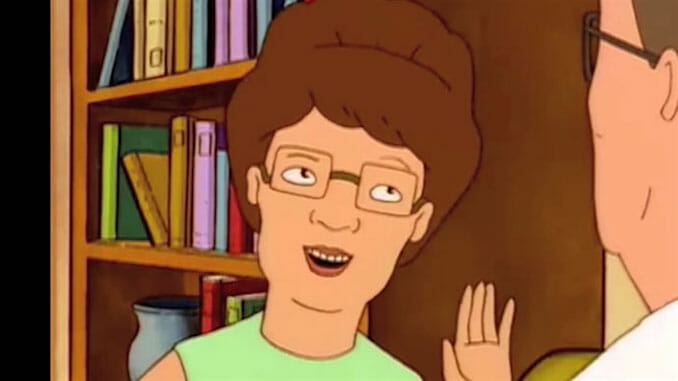In Defense of Peggy Hill, Our Complex Heroine of Hope
Photo Courtesy of FOX
Peggy Hill is the hated wife and mother of adult animated TV—a quick Google search will tell you exactly why. Peggy is arrogant, sure, and could easily be read as a killjoy. She makes disturbed family meals and speaks in broken Spanish, which she occasionally uses to micro-aggress the racial minorities in her neighborhood. She also has a habit of passing common knowledge off as a discovery of her own; she’s a classic know-it-all all grown up, complete with the insecurities that fuel her most juvenile behavior. But like Breaking Bad’s Skyler White, this hatred of Peggy isn’t as baked into the show as fans may make it seem.
Next to Hank, Peggy is King of the Hill’s most complex character, and a keen satire on the way Southern suburbia mollifies women with talent into embittered sidekick roles to mediocre men. The veracity of her character is thanks in part to an impeccable performance by Kathy Najimy, who provides a deliciously varied and inimitable delivery to Mike Judge’s more controlled Hank Hill. These are the type of women who wind up so alone and bored they join multi-level marketing schemes (which Peggy herself is susceptible to), or get conned into diploma mills (which, again, Peggy has been a victim of). For a good chunk of the show’s 13 season run, there’s an effusive sympathy ascribed to the tragedy that is Peggy Hill, like in “Arrow Head,” where Peggy’s enthusiasm for the Native artifacts found in her frontyard is manipulated into a feat of public humiliation by a professor of archaeology.
Peggy’s faux-intellectual leanings often lead to messes like this—she’s the type to always reply “heard of that,” when someone off-handedly mentions something obscure. But King of the Hill isn’t a particularly mean-spirited show in the realm of adult animation, and shies away from laying in when characters are denigrated, as Peggy occasionally is.
In King of the Hill, to transgress your lot in life is to set yourself up for failure. Peggy is the antithesis of Hank in this regard—where Hank quakes in fear at the mere idea of propane being obsolete or the slightest bit of emotional honesty, Peggy craves immediate change and to feel transformed by big decisions. This core difference in expectations for their marriage is what led to the events of the Season 3 finale, “As Old as the Hills.” It’s a pretty classic set-up; Hank is blindsided when Peggy reveals she’s dissatisfied with their sedentary lifestyle after their 20 year wedding anniversary. Hank attempts to add some spice to their weekend alone in infuriating fashion.
They wind up lamenting all the things they never got to do, mostly because of Hank—they couldn’t have any other kids because of Hank’s narrow urethra, they threw away their dream of making a world-renowned steak sauce because Hank abandoned the project before it began, and they never travel because Hank is much more content staying put in Texas. Feeling squirrely amid stagnant feelings, Peggy witnesses a few parachuters floating down to Earth. She impulsively decides to sign Hank and herself up for skydiving, hoping to compete with their neighbors Kahn and Minh who brag about their bungee jumping anniversary. The gaggle of people sharing the plane with them all seem to be in a similar boat. They stare vacantly at the walls of the hull while muttering their empty reasons for boarding the flight. Like Peggy, they were attracted to the idea of skydiving by its revolutionizing quality. Their instructor stresses it’s an experience better than sex, and he likes sex “a lot.” Peggy is stricken with panic when she peers outside of the ship after watching Hank jump successfully, but is reinforced in her decision after learning Hank’s stepmother is in labor. The scene of Peggy leaping from the plane is beautifully transposed against a scene of Didi giving birth. Just as Hank’s half-brother begins to crown, Peggy plummets to Earth, untethered due to a faulty parachute cord. and The episode ends.
The first few episodes of King of the Hill’s fourth season follow Peggy’s recovery from the incident, as she deals with being restricted by a full body cast and having to overcome physical therapy. Contrary to the dire subject matter, Peggy’s initially in good spirits—she wears her near-death experience like a badge of honor, touting it as a unique experience she’s attained that few others will ever understand. Peggy is a conqueror; she cheated death and survived an 8,000 foot fall. Her adrenaline high soon fades though into a crushing depression beset by being incapacitated. Her already fragile dignity is now threatened by her newfound physical limitations.
-

-

-

-

-

-

-

-

-

-

-

-

-

-

-

-

-

-

-

-

-

-

-

-

-

-

-

-

-

-

-

-

-

-

-

-

-

-

-

-








































